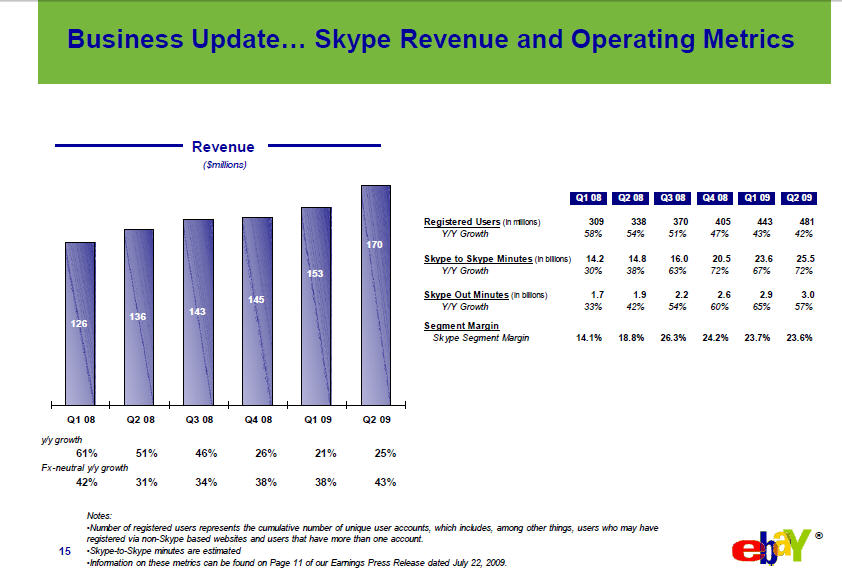eBay finds its Skype exit and it's probably for the best

EBay is reportedly ready to sell Skype to a group that includes Andreessen Horowitz and private equity firms. The big question is whether a sale makes sense right now.
According to the New York Times, eBay will announce a sale of Skype as early as Tuesday (Techmeme). EBay is looking for $2 billion for the unit, but the New York Times couldn't nail down a price. TechCrunch first reported eBay's potential sale of Skype last week. EBay announced in April that it planned to spin off Skype in an IPO.
As noted by Om Malik, the timing of the Skype deal is odd. Skype could go public and reap more than the $2 billion---assuming that's the price tag---for eBay. Despite a rocky market technology companies can go public. Skype could have gone public and done well. Malik argues that eBay overpaid for Skype, built it up a good bit and just when it may get a return the company sells it for roughly 3 times sales.
Indeed, Renaissance Capital has the recap of IPO pricings in the last 12 months and you'll find companies like Rosetta Stone, CDC Software and LogMeIn on the list. Surely Skype could go public too.
However, it's not that simple. Skype has some serious litigation issues, notably a lawsuit with Joltid Limited. From eBay's quarterly filing (emphasis mine):
In March 2009, Skype Technologies S.A. filed a claim in the English High Court of Justice (No. HC09C00756) against Joltid Limited. Following the filing of the claim, Joltid purported to terminate the license agreement between the parties. In particular, Joltid has alleged that Skype should not possess, use or modify certain software source code and that, by doing so, and by disclosing such code in certain U.S. patent cases pursuant to orders from U.S. courts, Skype has breached the license agreement. Joltid has brought a counterclaim alleging that Skype has repudiated the license agreement, infringed Joltid’s copyright and misused confidential information. On the basis of, among other things, the parties’ mutual dealings since the execution of the license agreement, Skype asked the English High Court for declaratory relief, including findings that Skype is not in breach of the license agreement, that Joltid’s notice of breach and subsequent notice of termination are invalid, and that Joltid has certain indemnity obligations in relation to the U.S. patent proceedings. Trial is currently scheduled for June 2010. Although Skype is confident of its legal position, as with any litigation, there is the possibility of an adverse result if the matter is not resolved through negotiation. Skype has begun to develop alternative software to that licensed through Joltid. However, such software development may not be successful, may result in loss of functionality or customers even if successful, and will in any event be expensive. If Skype was to lose the right to use the Joltid software as the result of the litigation, and if alternative software was not available, Skype would be severely and adversely affected and the continued operation of Skype’s business as currently conducted would likely not be possible.
In a nutshell, Skype couldn't go public until after June 2010. Do you really want to bet on the market conditions in June 2010? Skype has all the potential to be a quagmire for eBay and the distraction could be immense.
Here are the considerations to ponder:
- eBay invests engineering time in Skype to find a workaround for the Joltid suit;
- Maybe it settles and pays Joltid to settle out of court;
- In the meantime, the market conditions unravel;
- eBay can't find a way to take Skype public in 2010;
- eBay is stuck with a fine business, but one that it doesn't want;
- And eBay needs to focus on its core e-commerce businesses.
Or...
- eBay can take its $2 billion and almost break even on an acquisition that was a bad idea from the beginning.
What would you do? In that context, door No. 2 looks pretty good.
